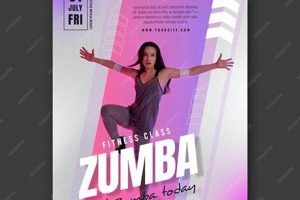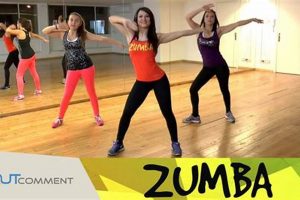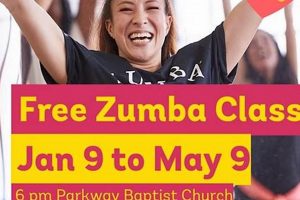Opportunities for complimentary Zumba sessions exist within the Denver metropolitan area. These offerings provide individuals access to a fitness program combining dance and aerobic movements, generally set to Latin-inspired music, without incurring a direct monetary cost for participation.
Participation in accessible fitness opportunities promotes community engagement and enhances overall well-being. Such programs can reduce financial barriers to physical activity, thereby encouraging wider participation and potentially contributing to improved public health outcomes. Historically, community centers and non-profit organizations have played a vital role in offering these resources to underserved populations.
The subsequent discussion will detail avenues for locating no-cost Zumba instruction, factors to consider when selecting a program, and potential advantages gained through participation in such activities within the specified geographical location.
Guidance for Locating Complimentary Zumba Instruction in Denver
The following provides a structured approach to identifying and evaluating no-cost Zumba opportunities within the Denver area.
Tip 1: Leverage Community Center Resources: Denver’s network of community centers frequently hosts a range of free activities, including fitness classes. Directly contact local centers or consult their online schedules to ascertain Zumba availability. Example: Check the Denver Parks and Recreation website for community center programs.
Tip 2: Explore Non-Profit Organizations: Organizations dedicated to health and wellness promotion may offer complimentary fitness programs. Investigate organizations like the YMCA or local health initiatives for potential Zumba offerings. Example: Review the YMCA of Metropolitan Denver’s class listings.
Tip 3: Consult Local Parks and Recreation Departments: Denver’s Parks and Recreation departments often organize outdoor fitness programs during favorable weather conditions. These programs may include Zumba instruction at no cost to participants. Example: Monitor Denver’s Park and Recreation event calendar for Zumba sessions.
Tip 4: Utilize Online Search Platforms: Employ search engines with specific search terms to uncover advertised offerings. Use search terms such as “free Zumba class Denver” or “Denver free fitness programs.” Example: Refine search queries to include specific neighborhoods or timeframes.
Tip 5: Monitor Social Media Groups: Local community groups on social media platforms occasionally disseminate information about no-cost activities. Join relevant groups and monitor postings for Zumba-related announcements. Example: Search for Denver-based fitness or community groups on Facebook.
Tip 6: Inquire at Fitness Studios: Select fitness studios may offer introductory sessions or community outreach programs that include complimentary classes. Contact local studios to inquire about such opportunities. Example: Research studios offering Zumba and inquire about promotional periods.
Consistent with the provided tips, it is crucial to verify schedule details, instructor qualifications, and class location to ensure compatibility with individual needs and preferences. Prioritizing safety and well-being is paramount.
The ensuing segments will focus on maximizing the benefits of complimentary Zumba classes and managing potential limitations associated with these resources.
1. Accessibility
Accessibility constitutes a critical determinant of participation rates in complimentary Zumba programs within Denver. The degree to which these classes are easily approachable, both physically and logistically, significantly impacts their effectiveness in promoting community wellness and fitness.
- Geographic Proximity
The physical location of classes relative to potential participants’ residences or workplaces directly influences accessibility. Classes offered in geographically dispersed locations or easily reachable by public transportation enhance opportunity for participation among a broader demographic. For example, a class hosted in a centrally located community center, accessible by multiple bus routes, demonstrates high geographic accessibility.
- Scheduling Considerations
Class schedules must align with the diverse routines of prospective participants. Classes offered during non-standard hours, such as evenings or weekends, may accommodate individuals with inflexible work schedules or family obligations. A lack of schedule flexibility restricts access for specific populations. For instance, classes exclusively scheduled during weekday business hours limit access for full-time employees.
- Enrollment Procedures
The complexity of enrollment processes can act as a barrier to participation. Streamlined registration, online options, and minimal paperwork facilitate broader access. Cumbersome enrollment processes, involving lengthy forms or in-person registration only, diminish program accessibility. Offering online enrollment and requiring only minimal personal information streamlines the process, promoting accessibility.
- Inclusivity of Diverse Needs
Accessibility extends to inclusivity of participants with varying physical abilities and language proficiencies. Programs that offer adaptations for individuals with disabilities or language support for non-English speakers enhance inclusivity. The absence of these considerations limits access for specific segments of the population. Provision of visual cues or alternative movements caters to participants with hearing or mobility limitations.
The combined influence of geographic proximity, scheduling considerations, simplified enrollment, and inclusive programming directly determines the overall accessibility of complimentary Zumba instruction in Denver. Optimized accessibility translates to broader community engagement and more equitable access to fitness opportunities.
2. Instructor Qualification
Instructor qualification represents a critical component of effectively delivered complimentary Zumba instruction in Denver. The instructor’s expertise and credentials directly impact participant safety, program effectiveness, and overall satisfaction. Proper qualification ensures the class adheres to established fitness standards and provides a beneficial experience.
- Certification and Training
Valid Zumba instructor certification, typically granted by Zumba Fitness, LLC, signifies the instructor has completed requisite training in Zumba techniques, safety protocols, and music interpretation. Absence of certification raises concerns about instructor competency and potential for improper instruction. Licensed instructors may also have CPR/AED certification, enhancing preparedness for medical emergencies. For instance, a certified instructor understands modifications for various fitness levels, promoting safety for all participants.
- Experience and Expertise
Beyond certification, instructor experience shapes the quality of instruction. Experienced instructors demonstrate an ability to adapt teaching styles to diverse groups, provide clear and concise instructions, and motivate participants effectively. Expertise encompasses knowledge of anatomy, physiology, and injury prevention. A seasoned instructor observes participant form and corrects movements, minimizing the risk of strain or injury during the complimentary Zumba session.
- Insurance Coverage
Qualified instructors typically maintain professional liability insurance. This insurance offers protection in the event of participant injury during a Zumba class. Absence of insurance coverage exposes both instructor and facility to potential liability. Ensuring instructors possess adequate insurance coverage is a risk management consideration for organizations providing the complimentary sessions.
- Background Checks and Screening
Organizations offering complimentary Zumba classes should conduct background checks on instructors, particularly when working with vulnerable populations, such as children or seniors. Background checks mitigate the risk of employing individuals with criminal records or histories of misconduct. Implementing thorough screening processes reflects a commitment to participant safety and ethical program management within the context of freely provided Zumba programs.
The aspects of certification, experience, insurance, and screening collectively define instructor qualification within the framework of complimentary Zumba instruction in Denver. Diligence in verifying these elements safeguards participant well-being and contributes to the overall credibility and value of the free programs. Prioritizing qualified instructors fosters a positive and safe environment, promoting long-term engagement with fitness activities.
3. Class Schedule
The class schedule is an integral component of no-cost Zumba instruction availability in Denver, directly affecting accessibility and program utility. Scheduling frequency, timing, and duration influence potential participation. Infrequent sessions or inconvenient times limit accessibility despite the absence of financial charges. Example: a weekly class at 2:00 PM on a weekday restricts attendance for those with standard work schedules, while multiple sessions at varying times across the week broaden the opportunity for involvement.
The establishment of effective Zumba schedules necessitates consideration of target demographic constraints. Student-oriented schedules necessitate evening or weekend sessions to accommodate academic commitments. Schedules intended for senior populations require weekday morning or afternoon classes, accounting for potential transportation or energy level limitations. The duration of each session impacts participant ability to commit and physical endurance. Classes exceeding 60 minutes may deter new or less physically fit individuals. A well-designed schedule increases program attractiveness and optimizes resource utilization.
Schedule planning requires ongoing evaluation. Monitoring class attendance, gathering participant feedback, and adjusting session times enhance programmatic responsiveness and efficacy. Ignoring participant needs or maintaining static schedules diminishes the potential beneficial impact. Effective scheduling transforms a Zumba offering into a widely accessible, health-promoting resource within the Denver community, facilitating physical activity and fostering social engagement among diverse populations.
4. Location Proximity
Location proximity represents a crucial determinant influencing participation rates and overall success of complimentary Zumba programs within Denver. The accessibility of class venues directly impacts convenience, transportation costs, and time commitment, factors which subsequently affect program engagement and retention.
- Transportation Accessibility
Proximity to public transportation networks, such as bus routes and light rail stations, significantly enhances accessibility for individuals lacking personal vehicles. Locations with convenient access to public transit reduce transportation costs and travel time, thereby removing a significant barrier to participation. A Zumba class situated near a major transit hub demonstrates superior transportation accessibility compared to one located in a remote area with limited public transportation options. Facilitating access via public transit expands the potential participant pool, especially for low-income individuals who may rely on public transportation.
- Neighborhood Safety
The perceived safety of the surrounding neighborhood influences individuals’ willingness to travel to a given location, especially during evening hours or in areas with high crime rates. Venues located in well-lit, secure environments promote a sense of safety and encourage participation. Conversely, classes held in areas perceived as unsafe may deter potential participants, regardless of the program’s cost-effectiveness. For example, a Zumba session in a well-patrolled community center fosters a greater sense of security than one in an isolated location lacking adequate lighting and security measures.
- Walking Distance and Convenience
For individuals residing within walking distance of a class venue, proximity represents a significant advantage. Reduced travel time and the absence of transportation costs promote consistent participation. Locations near residential areas or community hubs offer increased convenience and encourage spontaneous attendance. A class situated within a walkable distance from a senior living facility, for instance, offers heightened convenience for elderly residents compared to one requiring transportation to a distant location. Emphasizing walkable distances enhances program accessibility and fosters community engagement.
- Parking Availability
Adequate parking availability is a critical factor for individuals who rely on personal vehicles. Limited parking or high parking costs can discourage participation, particularly in densely populated urban areas. Venues with ample, free parking mitigate this barrier and encourage attendance. A facility with a dedicated parking lot offers a significant advantage over one lacking parking facilities or imposing parking fees. Providing convenient and affordable parking options increases program attractiveness and facilitates participation for individuals who depend on personal transportation.
The combined influence of transportation accessibility, neighborhood safety, walking distance, and parking availability determines the overall locational desirability of a given free Zumba offering in Denver. Optimizing these factors enhances program accessibility and promotes broader community engagement with fitness opportunities.
5. Participant Skill Level
Participant skill level significantly influences the benefits derived from complimentary Zumba instruction opportunities in Denver. Aligning class difficulty with individual capabilities enhances safety, enjoyment, and long-term adherence to fitness programs. Mismatches between skill level and class demands can lead to injury, frustration, and attrition.
- Beginner-Friendly Instruction
Entry-level Zumba programs should prioritize clear, concise instructions and simplified choreography. Modifications for low-impact movements should be readily available. Emphasis should be placed on fundamental steps and rhythm development, rather than complex routines. For example, instructors might initially focus on basic salsa steps or cumbia rhythms before introducing intricate combinations. Failure to provide beginner-friendly instruction can discourage novice participants, creating a barrier to entry and perpetuating health disparities.
- Intermediate Adaptation
Intermediate-level classes require instructors capable of modifying routines to accommodate varying fitness levels within the group. Clear communication about intensity options and alternative movements is essential. Participants with some prior dance or fitness experience should be challenged while maintaining a safe environment. Examples include incorporating more complex footwork or increasing the pace of routines. Inadequate adaptation can lead to both under-stimulation for experienced participants and overexertion for those with limited fitness backgrounds.
- Progressive Skill Development
Structured Zumba programs should incorporate a progressive curriculum, gradually increasing the complexity and intensity of routines over time. This approach allows participants to build skills incrementally, fostering confidence and preventing plateaus. For instance, a beginner class might progress from basic steps to simple choreographed routines over several weeks. The absence of progressive skill development can result in boredom for experienced participants and a lack of advancement for beginners.
- Modifications for Physical Limitations
Instructors should be trained to provide modifications for participants with physical limitations, such as joint pain, mobility issues, or cardiovascular concerns. Modifications might involve reducing the range of motion, using chairs for support, or adjusting the tempo of movements. For example, individuals with knee problems might be advised to minimize deep squats or high-impact jumps. Neglecting to address physical limitations can increase the risk of injury and exclude individuals with disabilities from participating in the program.
Effective consideration of participant skill level in complimentary Zumba programs within Denver ensures inclusivity, maximizes benefits, and promotes long-term engagement with fitness activities. Programs that cater to diverse skill levels and physical abilities create a supportive environment where individuals can achieve their fitness goals safely and effectively.
Frequently Asked Questions
This section addresses common inquiries regarding no-cost Zumba opportunities within the Denver metropolitan area.
Question 1: What constitutes “free Zumba classes” in the Denver context?
The term “free Zumba classes” denotes Zumba instruction for which participants are not directly charged a fee for participation. Such classes are often sponsored by community organizations, non-profit entities, or government agencies.
Question 2: Where can information regarding complimentary Zumba sessions be obtained?
Information can be sourced from local community centers, recreation departments, non-profit organizations focused on health and wellness, and online event listings. Direct contact with relevant organizations is advised for verification of schedule details and program availability.
Question 3: Are there any prerequisites or registration requirements for participation?
Specific prerequisites or registration requirements vary depending on the sponsoring organization. Advance registration may be required to secure a spot in the class. Review of program descriptions is recommended to ascertain any age restrictions, skill level requirements, or necessary documentation.
Question 4: Are instructors of complimentary Zumba classes adequately qualified?
While instructor qualifications can vary, reputable organizations generally ensure instructors possess valid Zumba certifications and relevant experience. Verification of instructor credentials through the sponsoring organization is advisable.
Question 5: What potential limitations exist with complimentary Zumba programs?
Potential limitations may include limited class availability, inflexible scheduling, crowded class sizes, and less personalized instruction compared to paid programs. These factors should be considered when evaluating the suitability of a free program.
Question 6: Are there alternative low-cost Zumba options available in Denver if complimentary programs do not meet needs?
Several low-cost alternatives exist, including community center memberships, discounted fitness class packages, and introductory studio offers. Exploration of these options may provide greater flexibility and program variety.
Complimentary Zumba instruction provides a valuable resource for promoting community health and wellness. Thorough investigation and realistic expectations ensure a positive and beneficial experience.
The subsequent section will offer concluding remarks summarizing key insights and highlighting the potential benefits of engaging with accessible fitness programs.
Conclusion
This exposition has thoroughly examined various facets of complimentary Zumba instruction within the Denver metropolitan area. Key considerations encompass accessibility, instructor qualifications, scheduling feasibility, locational convenience, and participant skill level. Effective navigation of these elements maximizes the potential for beneficial engagement with such programs.
Ultimately, accessible and qualified fitness opportunities contribute to enhanced community well-being. Investigation of available resources and mindful program selection constitute prudent steps toward achieving personal fitness goals and fostering a more active lifestyle within the Denver context. Continued awareness and utilization of these free resources hold the potential to positively impact public health outcomes.




![Find FREE Zumba Classes Near Me for Ladies - [Location]! The Ultimate Zumba Guide: Dance Your Way to a Healthier You Find FREE Zumba Classes Near Me for Ladies - [Location]! | The Ultimate Zumba Guide: Dance Your Way to a Healthier You](https://mamazumba.com/wp-content/uploads/2025/10/th-896-300x200.jpg)


